Introduction
In the dynamic realm of corporate finance, the role of consulting is pivotal in guiding businesses toward financial success. Effective corporate finance consulting is built on a foundation of key principles that ensure alignment with an organization’s goals and priorities. From understanding the unique financial landscape of each client to fostering open communication and stakeholder engagement, these principles are crucial for tailored strategies that yield desired outcomes.
Corporate finance consultants employ a range of services, leveraging technology and data-driven insights to navigate the rapidly changing business environment. They play a critical role in strategic planning, risk management, and financial analysis, providing comprehensive solutions that free up time for innovation and strategic growth. Real-world examples underscore the value of these consulting strategies, showcasing how consultants help businesses enhance revenue, reduce costs, and optimize operations, especially during financially challenging times.
Unlocking a business's full potential involves a blend of powerful technology, industry expertise, and strategic decision-making. Corporate finance consultants are instrumental in driving growth, ensuring regulatory compliance, and fostering long-term stability, making them an invaluable asset for any organization aiming to thrive in today’s competitive market.
Key Principles of Effective Corporate Finance Consulting
Effective corporate finance consulting hinges on several fundamental principles. Firstly, a deep understanding of the client's unique financial landscape is crucial. 'Consultants must coordinate their approaches with the organization’s goals, ensuring tailored solutions that resonate with the company’s objectives.'. Fostering open communication and prioritizing stakeholder engagement are essential to secure buy-in for proposed strategies and changes. This alignment not only facilitates smoother implementation but also significantly enhances the likelihood of achieving the desired financial outcomes.
In practice, corporate finance advisors provide a variety of services that assist businesses in flourishing within a swiftly evolving environment. For example, they harness technology as a transformative force, helping organizations reframe their future and industry. They also provide easy-to-integrate solutions for non-core yet business-critical activities, freeing up time for innovation.
Furthermore, advisors play a pivotal role in strategic planning by providing data-driven insights. These insights inform decisions on budgeting, funding, and capital investment, ensuring efficient resource allocation. They also evaluate investment opportunities, analyzing stocks, bonds, and other securities to recommend optimal actions.
Risk management is another critical area where corporate finance consultants excel. They recognize and reduce monetary risks by evaluating risk elements that could affect the organization and proposing methods to lessen their impacts. Additionally, they ensure regulatory compliance, safeguarding the company from legal and monetary penalties.
The significance of monetary assessment in corporate strategy cannot be emphasized enough. It is not just about numbers; it’s about shaping the future of a business. By utilizing historical data, statistical tools, and economic modeling, consultants anticipate results such as sales, revenue, expenses, and earnings, paving the way for informed decision-making.
Real-world examples highlight the effectiveness of these consulting strategies. For instance, during the early months of the pandemic, financial improvement consulting saw a 56% increase in client engagements, focusing on enhancing revenue, reducing costs, and optimizing operations. Such engagements demonstrate how consulting firms help organizations navigate financially challenging environments by providing targeted guidance and achieving meaningful outcomes.
In summary, corporate finance consulting is about unlocking the full potential of a business’s ambition, supporting expansion, transformation, integration, governance, and financing. By blending powerful technology, distinctive capabilities, and industry experience, consultants address their clients’ toughest challenges, driving strategic decisions, fostering growth, and ensuring long-term stability.
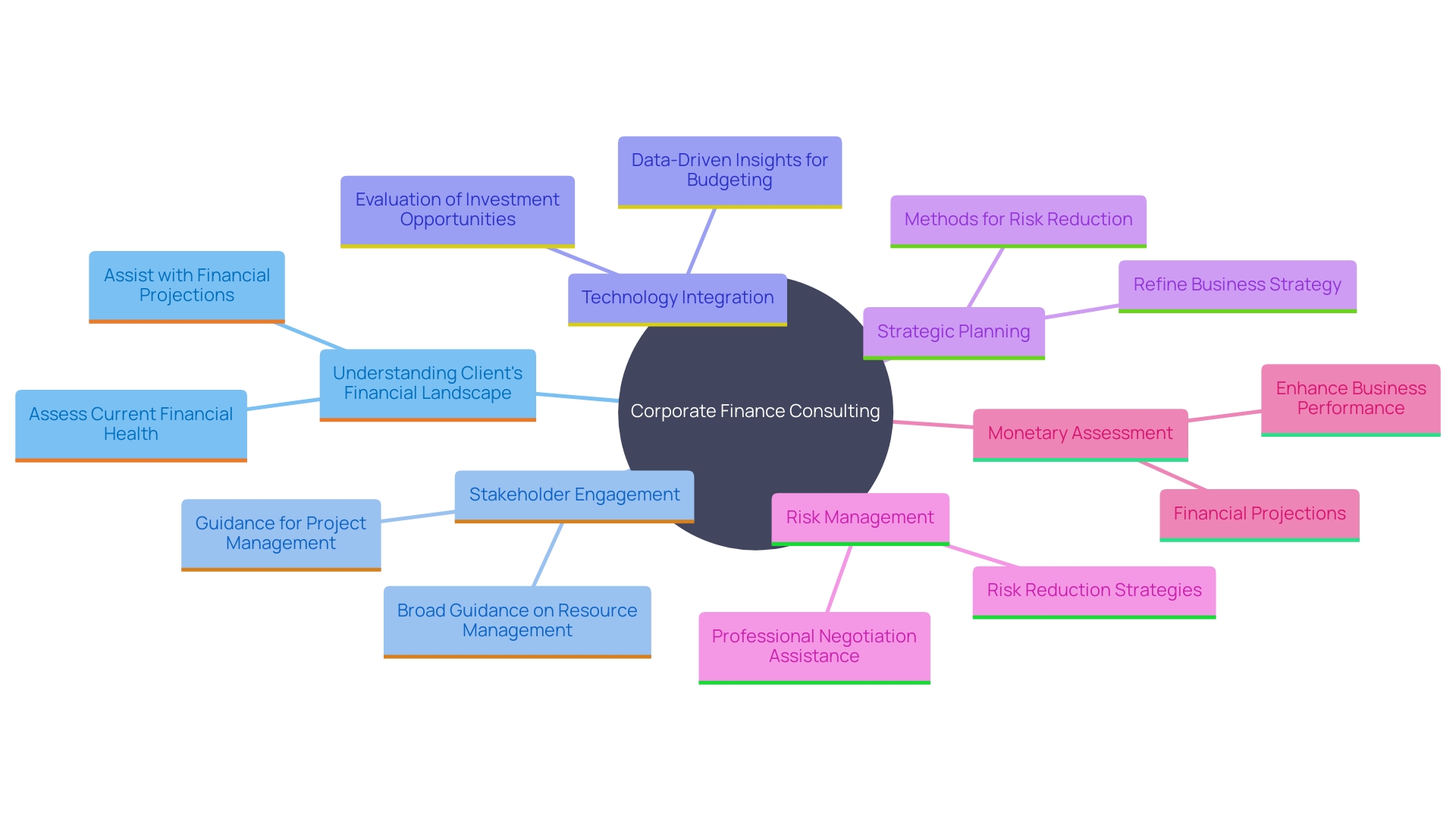
Strategic Planning in Corporate Finance
Strategic planning in corporate finance consulting demands a meticulous approach, integrating comprehensive analysis of market conditions, competitive landscapes, and internal capabilities. Analysts in economics play a critical role, leveraging historical data, statistical tools, and modeling to predict outcomes such as sales, revenue, expenses, and earnings. This data-driven insight informs decisions on budgeting, funding, and capital investment, ensuring efficient resource allocation.
Developing a clear roadmap is vital. This roadmap should outline financial objectives, resource allocation, and key performance indicators (KPIs). Performance reporting and management become crucial here, as understanding past performance and trends decides the feasibility of current plans and approaches. Consistent performance reporting bridges the gap among departments, guiding them in tracking revenue and expense targets while providing valuable insights to maintain the enterprise's course.
Monthly Budget vs. Actual reports are essential, allowing collaboration with department heads to address variances and adjust strategies proactively. Cash Flow Forecasting Reports assist in anticipating future monetary liquidity, ensuring the organization can navigate uncertainties effectively.
Furthermore, monetary statements such as balance sheets, income statements, and cash flow statements offer a thorough perspective on the organization's economic health. For companies lacking dedicated FP&A teams, consultants with expertise in ongoing data analysis and performance monitoring can be invaluable. These specialists construct detailed reports and visualizations, supporting executives in making informed, strategic decisions.
This integrated approach to strategic planning, combining thorough analysis, clear roadmaps, and robust performance reporting, positions organizations to navigate uncertainties and achieve long-term success.
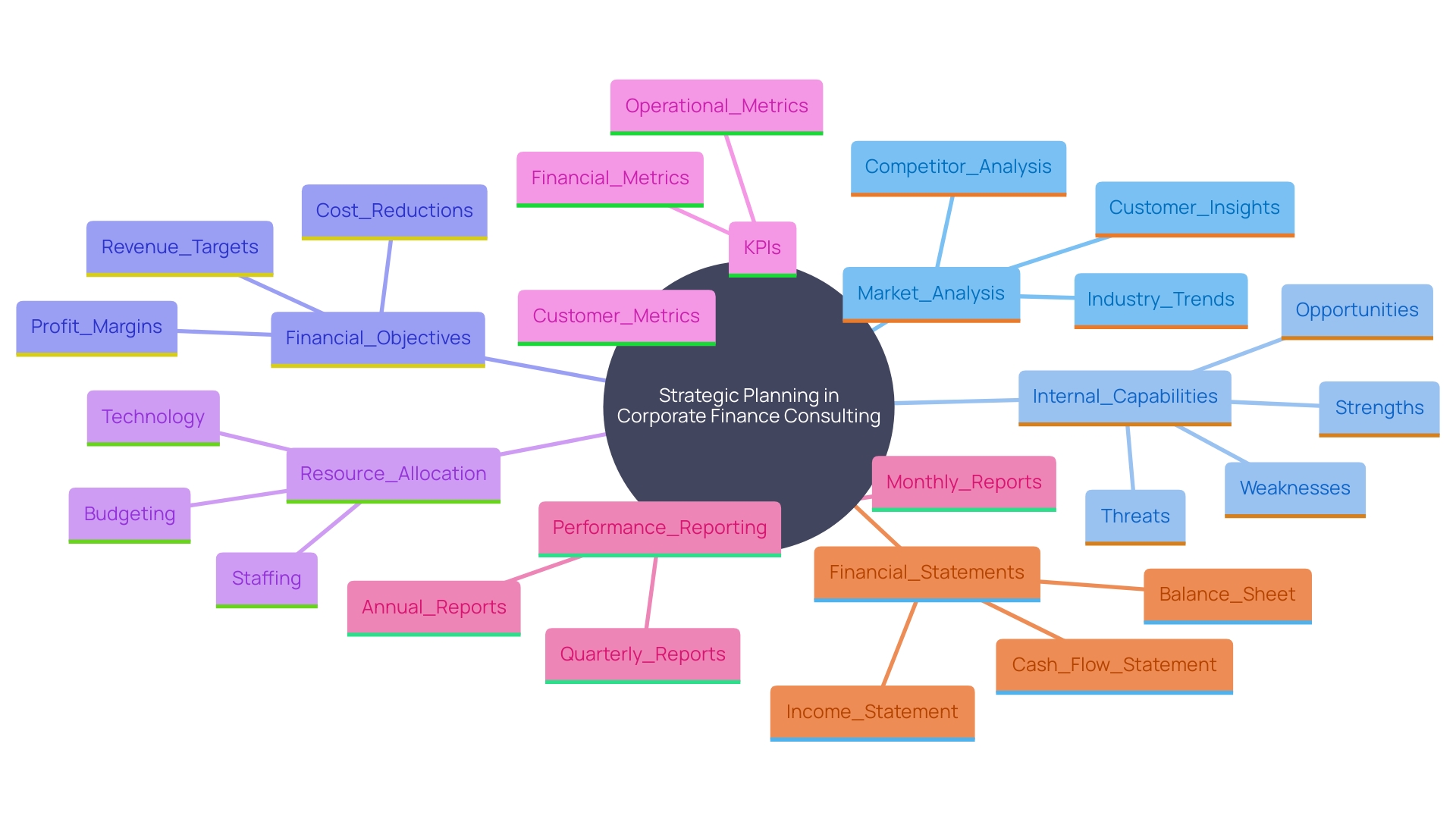
Financial Modeling Best Practices
Developing strong economic models is a cornerstone of effective corporate finance consulting. Best practices include ensuring models are flexible, transparent, and easily interpretable. Utilizing scenario analysis and stress testing enhances the model's reliability and prepares organizations for various market conditions. For instance, Monte Carlo simulations, as analyzed in a recent case study, offer detailed forecasts that can significantly improve decision-making processes. Regularly updating models based on real-time data and feedback ensures ongoing relevance and accuracy. As emphasized by analyst Karthika Gopalakrishnan, clear communication with business operations and management is crucial to ensure that the models are understood and trusted, paving the way for effective collaboration and successful implementation. This approach not only enhances financial efficiency but also aligns with the dynamic nature of evolving market conditions.
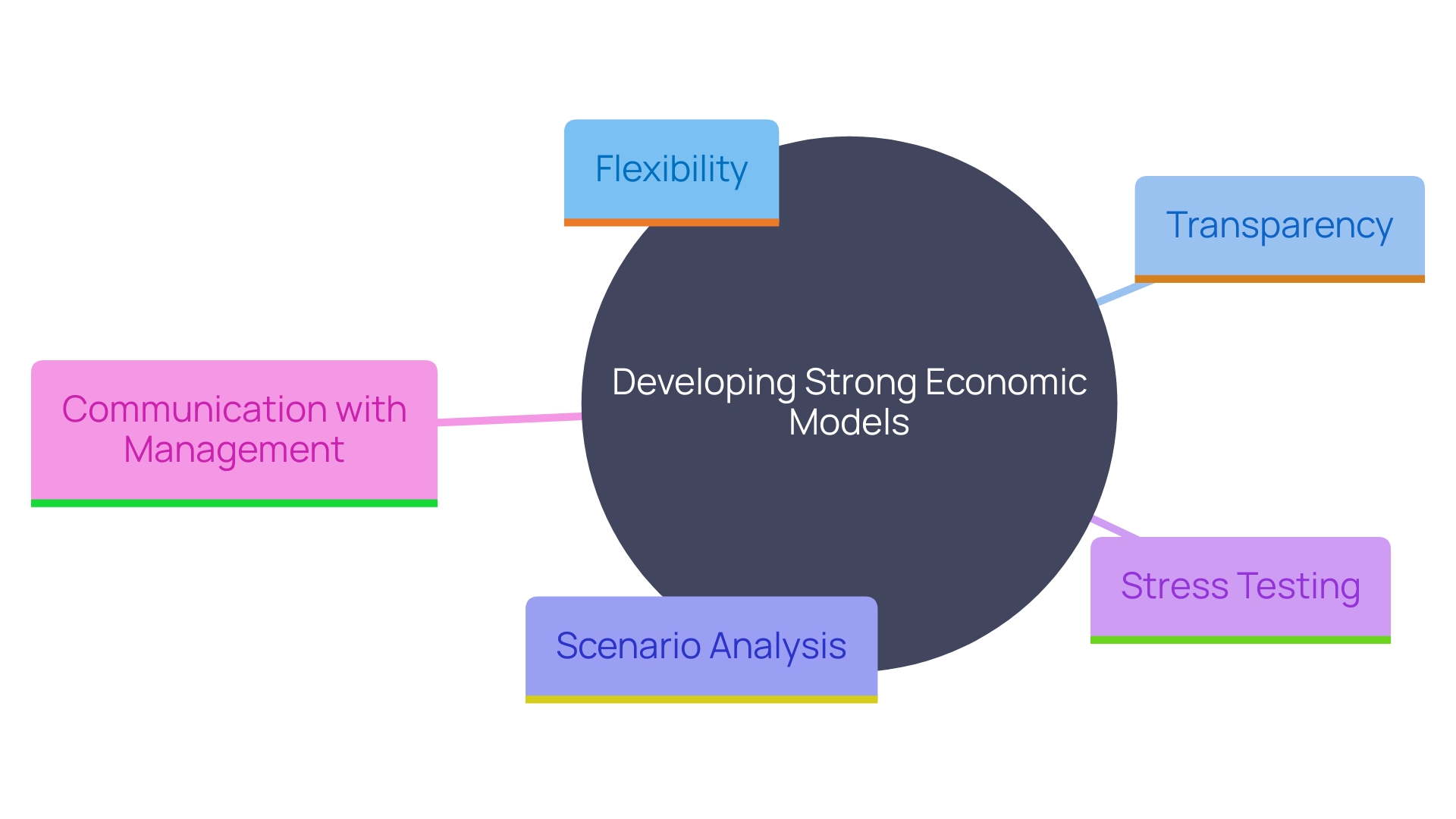
Engaging Consultants: Best Practices for Corporate Finance
Involving outside experts necessitates a strategic and meticulous approach. Organizations must begin by clearly defining their objectives and expectations. This clarity helps in aligning goals and measuring success. Conducting thorough due diligence on potential advisors is paramount. It involves assessing their experience, track record, and industry knowledge. As Ford Stokes from Active Wealth Management suggests, hiring a licensed CPA and financial advisor can significantly aid in managing cash flow and reducing costs. Additionally, establishing a collaborative relationship with consultants fosters a productive working environment. As stated by Chris Khoury of Cheetah Capital, pursuing strategic collaborations with firms that match your vision can utilize their expertise and resources while retaining authority over the operation. This collaboration not only propels the enterprise forward but also strengthens a lasting partnership. In practice, companies like Aria Systems have gained significantly by collaborating closely with advisors from strategic planning through execution, measurement, and board review, navigating dynamic markets effectively. By focusing on building credibility and delivering on business plans, organizations can maximize the value derived from consulting services.
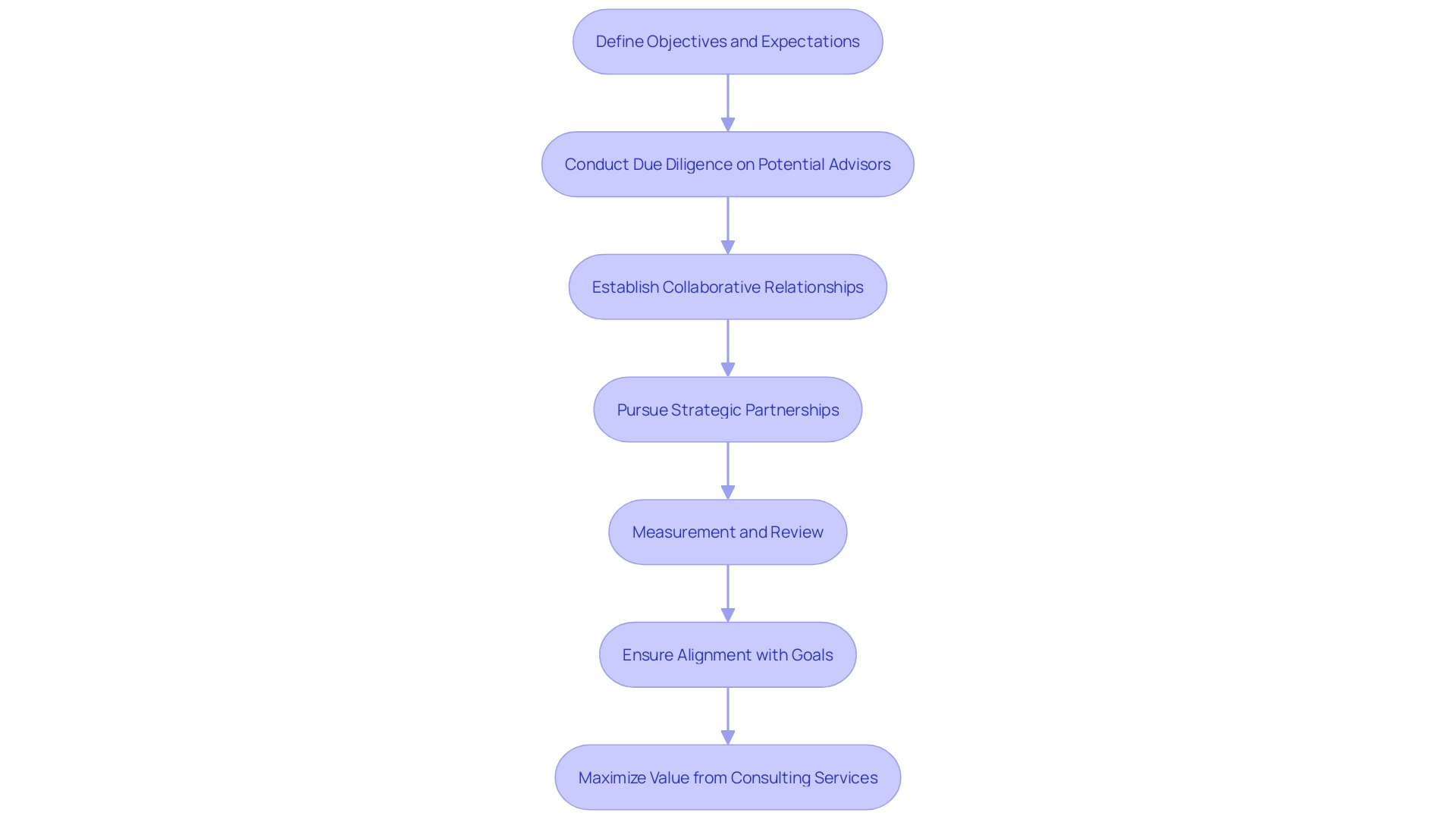
Overcoming Resistance and Ensuring Collaboration
Resistance to change is a significant obstacle in corporate finance transformations. To effectively address this, consultants must delve into the underlying reasons for resistance and actively involve stakeholders throughout the transformation process. Creating a culture where feedback is genuinely valued can foster trust and encourage collaboration, essential for successful change. Training and support initiatives play a crucial role in empowering employees to adopt new financial practices. Recent insights from a business briefing by CISL and Accounting for Sustainability highlight the growing consensus on the need for businesses to prioritize sustainability over short-term profit maximization. This shift necessitates new skillsets and evolved processes within Finance Functions to align with sustainable practices. By adopting a comprehensive framework to address concerns and challenges, and celebrating small wins, companies can create an environment that embraces change, driving innovation, growth, and long-term success. As Roman Regelman notes, understanding the conditions and readiness for transformation, and balancing revenue, cost, and culture are pivotal to achieving desired outcomes.
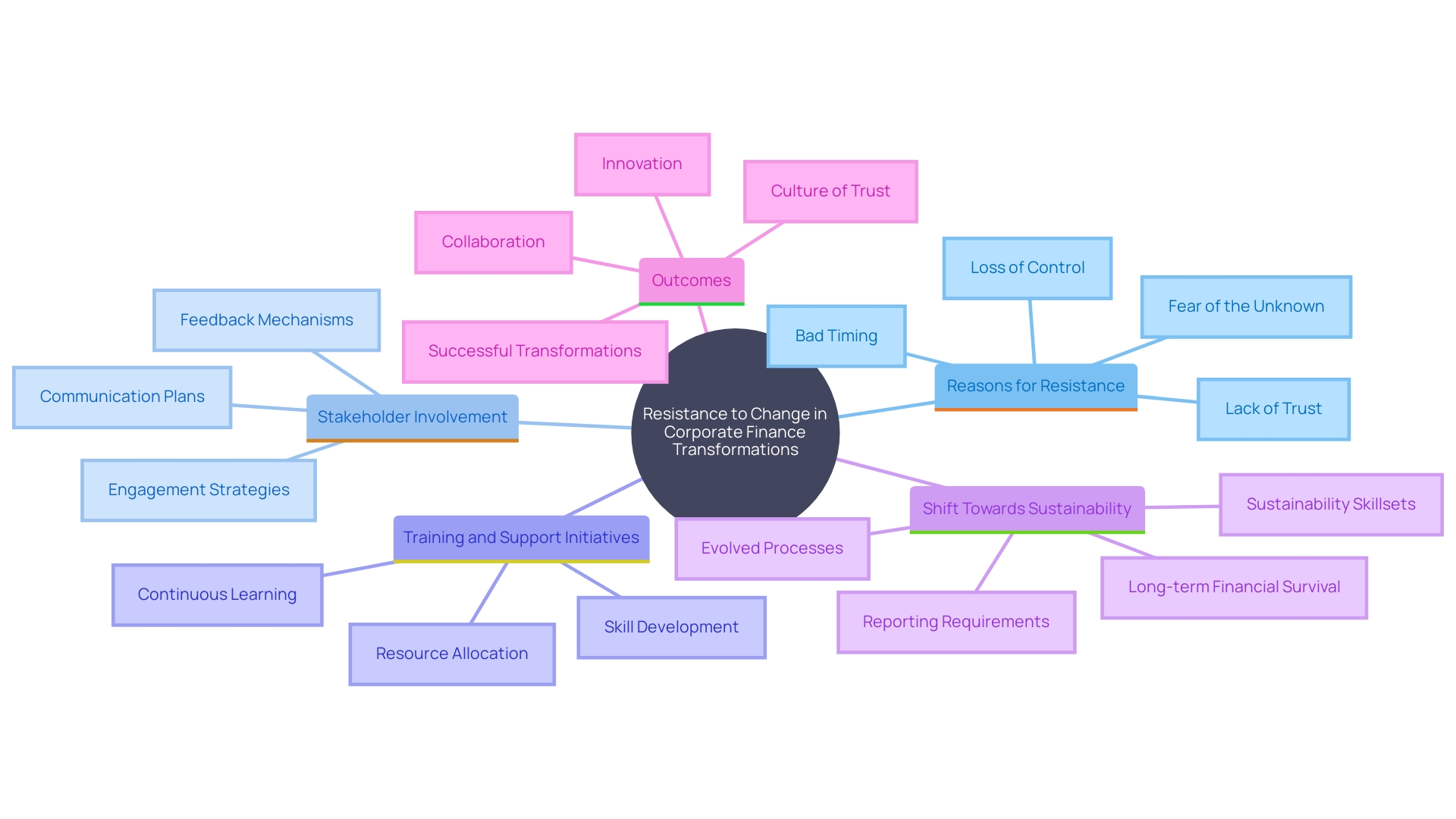
Regular Progress Meetings and Deliverables
Establishing a schedule for regular progress meetings is essential for maintaining momentum in corporate finance consulting engagements. These meetings should focus on reviewing deliverables, addressing challenges, and recalibrating strategies as needed. Clear reporting structures and accountability mechanisms ensure that all parties are aligned and remain focused on achieving the overall economic objectives. Regular progress meetings play a pivotal role in performance improvement engagements, which have seen a 56% increase according to recent reports. Additionally, clients frequently report improved efficiency and performance as outcomes of these engagements. This structured approach has been instrumental in supporting companies like Aria Systems to manage hyper-growth in dynamic markets, ensuring they stay on track and achieve their strategic goals. Moreover, engaging powerful and committed leadership, such as a strong FP&A or corporate planning team, can greatly improve a company's capability to reach its economic goals. Effective governance, supported by senior managers who actively participate in executing corporate strategies, is crucial for outperforming competitors. By maintaining this level of oversight and strategic alignment, organizations can navigate financial challenges more effectively and ensure sustainable growth.
Conclusion
The principles of effective corporate finance consulting are foundational to driving organizational success. A comprehensive understanding of a client’s unique financial landscape, coupled with open communication and stakeholder engagement, creates a synergy that enhances strategy implementation and achievement of financial objectives. By leveraging technology and data-driven insights, consultants provide tailored solutions that not only address current challenges but also empower businesses to innovate and grow.
Strategic planning stands as a cornerstone within this framework, demanding meticulous analysis and the creation of clear roadmaps that align with financial goals. The integration of performance reporting and cash flow forecasting ensures that organizations can navigate uncertainties with confidence. Additionally, financial modeling best practices, such as scenario analysis, further enhance decision-making capabilities, equipping businesses to adapt to ever-evolving market conditions.
Engaging consultants effectively requires clarity in objectives and a collaborative relationship that fosters trust and productivity. Overcoming resistance to change is critical, and creating a culture that values feedback can drive successful transformations. Regular progress meetings and accountability mechanisms are essential in maintaining momentum, ensuring that all parties are aligned and focused on achieving strategic financial goals.
In conclusion, corporate finance consulting is not merely a service but a strategic partnership that unlocks a business's potential. By embracing these best practices, organizations can navigate the complexities of the financial landscape, optimize performance, and secure long-term stability in a competitive market. Adopting a proactive approach to consulting engagements will yield significant benefits, ultimately leading to sustained growth and success.




